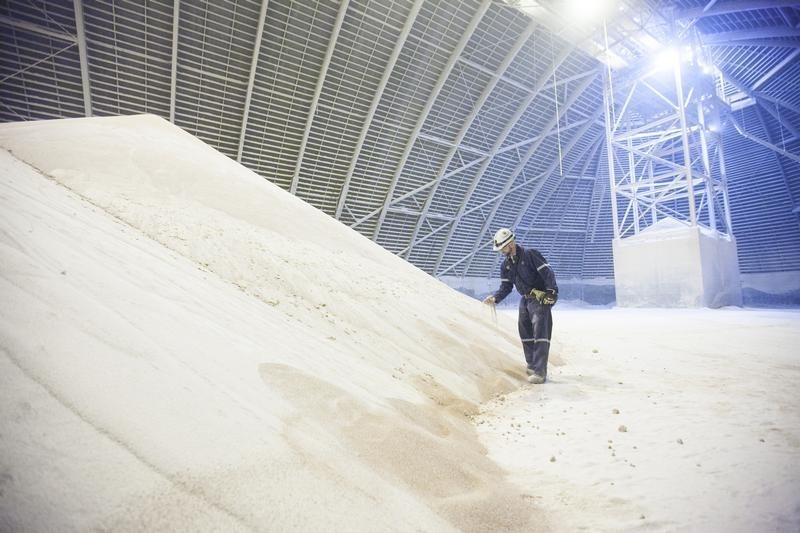By Rod Nickel
WINNIPEG, Manitoba, June 2 (Reuters) - North America's big
potash miners have doubled down on a production cut strategy
they hope will lift the fertilizer's price from a near decade
low, even as some investors warn this threatens their long-term
profitability and props up weaker rivals.
Shares of Potash Corp of Saskatchewan POT.TO POT.N and
Mosaic Co MOS.N , major players who have trimmed output when
prices weakened, are down nearly 50 percent from a year earlier
following their most recent production cuts.
Some suggest they should take a page from Saudi Arabia's oil
strategy, boosting production to drive out higher-cost
competitors, with the goal of maximizing profit over time.
"Lower prices would keep the new capacity out. That's more
sustainable than trying to artificially maintain the price by
closing (low-cost) facilities," said Bryan Agbabian, head of
agricultural equities at Allianz (DE:ALVG) Global Investors, which has
avoided potash company shares for three years.
While this new approach would hurt share values in the near
term, it would also begin a healthy industry transition, he
added.
Potash Corp, which confirmed it is sticking with its tighter
supply strategy, surprised many in January by closing its
eastern Canadian mine about a year after opening it.
"The reason it works well is the resources in potash are
more concentrated than any other commodity," Chief Executive
Jochen Tilk said in an interview, noting that a few players in
the industry have access to the majority of resources.
Mosaic CEO Joc O'Rourke told analysts last month that the
company will continue to cut production when markets soften.
Mosaic spokesman Ben Pratt said there has been no change in
strategy since then and executives were unavailable for further
comment.
Canpotex Ltd, the export potash sales agency for Potash,
Mosaic and Agrium Inc AGU.TO , earlier this year reduced
first-half export plans by 1.5 million tonnes, representing
nearly 8 percent of its estimated 2015 sales.
But industry watchers noted this controlled-supply strategy
helps European mines operated by K&S AG SDFGn.DE and ICL
Israel Chemicals ICL.TA continue to produce potash at some of
the highest costs in the business.
ICL is cutting operating costs in Spain, and plans to
convert its United Kingdom facility to a specialty form of
potash within two years. Those mines serve Europe's niche
markets that sometimes yield premiums, said ICL Chief Executive
Stefan Borgas.
"We don't lose any money anywhere," Borgas said.
DIFFERENT APPROACH FOR OIL, IRON ORE
Commodity producers in other sectors, notably the
Organization of the Petroleum Exporting Countries (OPEC), have
embraced short-term price pain in a bid to close down
higher-cost rivals, though competitors such as U.S. shale
producers have proved more resilient than expected.
Still, Brent crude LCOc1 is up one-third in 2016 after
bottoming out in January at its lowest price since 2003.
Likewise, spot iron ore .IO62-CNO=MB has gained 15 percent
in 2016, helped partly by a war of attrition waged by the
biggest suppliers that has driven out some higher-cost
competitors.
Wholesale U.S. Midwest potash prices, however, have fallen
this year by one-quarter to their lowest since mid-2007,
according to industry data compiled by NPK Fertilizer Advisory
Service.
Stone Asset Management has not owned Potash Corp shares
since early 2015, concerned that the company's strategy may cost
it market share, and that fertilizer buyers hold most of the
leverage, said portfolio manager Mohsin Bashir.
"What I fear for some of these companies with high dividend
payout ratios, is that they can curb production for a brief
period of time, but if they do it in perpetuity they're going to
have to face another dividend cut," Bashir said.
To be sure, some think high-cost potash mines are too small,
even if closed, to cure low prices by themselves, as seen by
Intrepid Potash Inc's IPI.N plan to idle its largest mine in
July.
The 2013 breakup of a marketing alliance between Uralkali
URKA.MM and Belaruskali increased competition, but didn't
significantly weed out competitors.
Belaruskali, the second-biggest potash miner, does not feel
pressured to cut output just because higher-cost producers are
hanging on, said the company's director general, Ivan Golovaty.
Andrey Ilyin, chief financial officer of EuroChem, said the
company is still planning on adding to global capacity by
building two Russian potash mines by 2018.
"We have no ready answer as to which marketing strategy is
best," he said. "Thankfully we do not have to decide on it
today."
